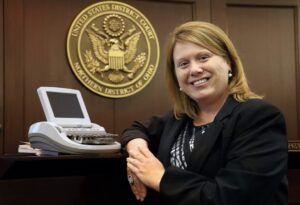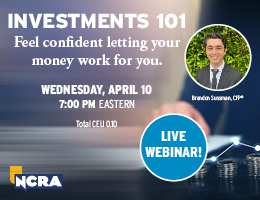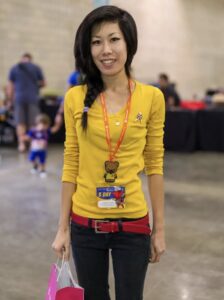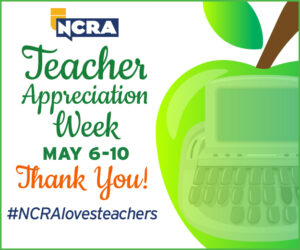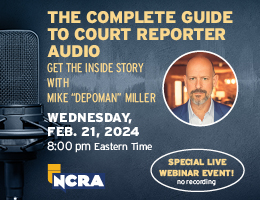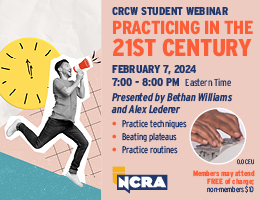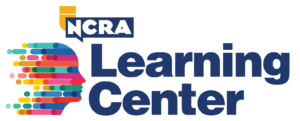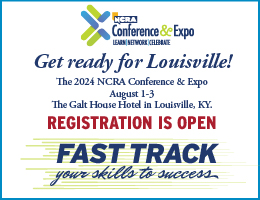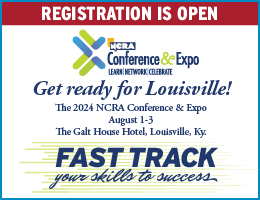Santo “Joe” Aurelio, FAPR, RDR (Ret.), has always had an attraction to the English language, first as a court reporter and later as a professor of English. He earned bachelor’s and master’s degrees from Harvard University, and a doctorate in education from Boston University. After he retired from reporting because of a hearing loss, he became a visiting professor at colleges in the Boston area. He teaches a variety of subjects, but mainly English grammar and medicolegal terminology. He will be teaching two live webinars, What Reporters Must Know about Punctuation on July 12, 6-7:30 p.m. ET and The Strange Backgrounds of Familiar Words, Part 1 on Aug. 1, 6-7:30 p.m. ET. The JCR caught up with him to find out a little more about his background and the reason behind his interest in this topic.
Tell us a little about your career.
I started night school at the Boston Stenotype Institute, and on the first night I met a girl, Josephine, who later became my wife. In 1975, she started freelance reporting — and she’s still at it!
I ranged all over Massachusetts during my career. During my 39 years, I had a wealth of experiences. I took some important cases (my first murder case was my first case in Korea!). I met some dynamic attorneys while working at the state labor department. My job at the federal agency was to travel around New England taking the testimony from disabled applicants for Social Security aid (some of that was sad). My first case in Superior Court was a criminal case (I was to take many of those). Other than some horrendous murder cases, possibly the two most important cases that I took in Superior Court: one involved the New England Patriots football team and the other, of course, was the Boston Strangler. In a sentence, I’ve had an interesting reporting career with fine memories and opportunities to meet and/or report important persons.
When did you become an NCRA member?
I became an NCRA member, I believe, in 1957. I did so because I believe in unity. When reporters gather together and unite, they have strength and can chart their future course or at least help to chart that course. When reporters join, their dues help to pay for professional advice and lobbying efforts. It’s patently unfair for unregistered reporters to have the benefit of all of the strides that their fellow registered reporters have worked hard for. I am solidly aligned with local, regional, and national unions!
Photo by jwygWhat started your interest in learning more about language than just what you needed for court reporting?
Even as a little kid of 10 or so, I would fool around with language (I’ll be back in a flash with some cash in my sash). Later I remember saying such things as “She would feint a faint.” I was always very interested in homonyms (such as made/maid) and what I would call pseudohomonyms (accede/exceed). In short, I was interested in language many years before I started stenotype reporting. I remember when I was about 14, there was a manual typewriter at the train station where I used to sell newspapers, and I used to put in a quarter to unlock it so that I could type on it for 30 minutes.
If you remember your days from your master’s and doctorate, what did you find was the difference you brought to your studies as a court reporter?
I went back to school late. I was almost 50 when I started my serious studying. My bachelor’s was 1983, the master’s was 1985, and the doctorate was 1989. What I think I brought to my studies was a deep focus that I had to use as a reporter: listening very carefully to every word spoken. In other words, because I was so serious about listening to and capturing every single word in court, I think that that held me in great stead in listening to my professors.
Frankly, it was very difficult to earn three degrees at night while working full-time in a busy court. How’d I do it? By being very motivated because I saw the handwriting on the wall: my hearing loss was making my daily job hard to do. I only succeeded in performing a creditable job in court by having a lot of speed (I passed a 280) and knowing and liking a great deal of English. And that’s how I lasted until 1990. (I wanted to teach in college, and to do that, one needs a lot of degrees.)
You’ve given one seminar for NCRA members recently, and you’re planning another one. What do you hope court reporters and captioners learn from your sessions?
I’ve done one webinar, and soon I’ll do another. I know that a lot of people, including reporters, have great difficulty with English, especially homonyms and pseudohomonyms. Mistakes are being made daily, and the reporters who commit them are not even aware that they’re using the wrong word or spelling a word incorrectly or malpunctuating a sentence. Well, even though I haven’t touched a stenotype since 1990, I still consider myself a reporter, and I feel that it’s my duty to correct or to help correct those who make those types of errors — and I want to do that until I hang up my skates. What I hope reporters will learn from these webinars is that I’d like all of them to learn and use the correct word or punctuation always.
Is there some advice that you would like all reporters and captioners to take to heart?
My advice to all reporters and captioners is to have the highest respect and fealty to the art and profession of reporting. It is an honorable profession. Think of it: Reporters are responsible for taking and transcribing all of the words of everybody. What could be more important than that? I rest my case.

